Language Science (B.A.)

The Language Science programme (B.A.) is the perfect choice for those looking to acquire a broad-based but specialized training in linguistics. The programme is characterized by its practical focus and the diverse range of options it offers students, who can select modules from the four mandatory elective areas: European Languages, Language Processing, Phonetics and Translation. Depending on their chosen areas of specialization, graduates from the programme have a wide range of career opportunities open to them in areas such as traditional and new media, the software industry, (machine) translation and research.
Entry restrictions do not apply to this programme. Students can only join the programme in the winter semester.
You can enrol in the first semester of this study programme directly via Saarland University's SIM portals. You do not need apply for admission beforehand. The enrolment deadline is the end of September.
Please note: If you want to switch subjects and plan to enrol in a higher semester of the new study programme ('higher-semester entry'), you will also need to submit an RPL certificate (RPL: recognition of prior learning) from the relevant examinations office.
Enrolment documents can only be submitted online during the enrolment application process in the relevant SIM portal.
If you have any questions about using the SIM portals, please check out our SIM Saarland help pages where you will find lots of useful information, videos and step-by-step guides.
Slightly different admission rules may apply to prospective students with a foreign higher education entrance qualification.
Central Student Advisory Service
Saarbrücken Campus
Building A4 4, Ground floor
Phone: +49 681 302-3513
studienberatung(at)uni-saarland.de
Central Student Advisory Service

Accredited study programmes
Saarland University was one of the first universities in Germany to achieve Quality Assurance Accreditation and has held the Accreditation Council's official quality mark continuously since 2012.
Quality management
